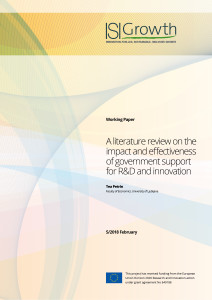This paper examines the empirical evidence on the impact and effectiveness of government support for R&D and innovation. It covers findings for EU and OECD countries, China and Taiwan. The period covered is 1960 till 2017. The review of the literature shows a great variety of empirical evaluations that focus on effects of either direct government support in the form of grants, subsidies and loans or indirect support in the form of tax incentives, on input additionality, output additionality, behavioural additionality and welfare. The review is structured according to this set of outcomes and effects.
The report notes a great heterogeneity of empirical studies, a wide range of empirical estimation approaches, and variety of definitions of studied outcomes. Further, there is a relative abundance of studies evaluating the effect of government support on R&D expenditure compared to the number of studies evaluating output additionality on a firm and macroeconomic levels, behavioural additionality or evaluating impact on welfare. The report concludes with the overview of main findings indicating that government support for R&D and innovation, either in the form of grants, subsidies and loans, or in the form of tax incentives on input, output and behavioural additionality as well as on welfare may have a positive impact but not always. The overall conclusion leans towards complementarily of public and private R&D expenditures and a positive but modest impact on innovation at the firm level. However, the magnitude of the effect varies with firm size, generosity of support, size of the project supported, sectors, the type of tax system, etc. The government support seems to be the most effective when targeting an innovation input –R&D expenditure. We suggest that to gain better understanding of the impact of government support for R&D and innovation to firms and to come to a more conclusive view of the nature and the magnitude of its impact and effectiveness, more studies evaluating the impact of government direct and indirect support on innovation output at the firm and macroeconomic levels as well as on welfare are needed and that due to a host of methodological issues, the pure econometric estimations of the impact and effectiveness of government support needs to be complemented by long-term ex-post evaluation studies and qualitative in-depth case studies.
A literature review on the impact and effectiveness of government support for R&D and innovation
Faculty of Economics, University of Ljubljana

